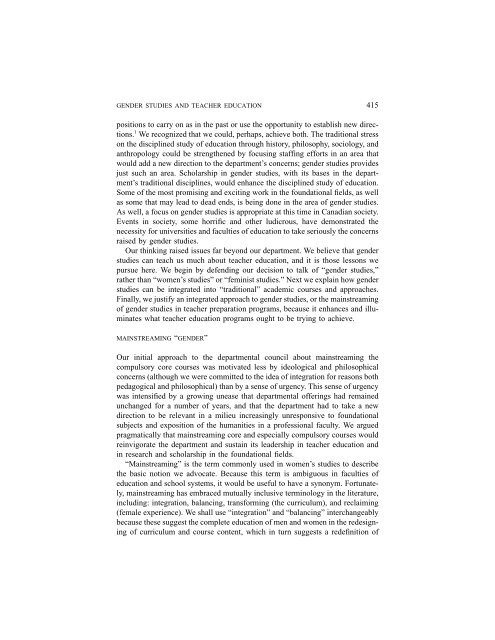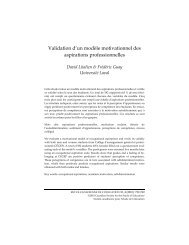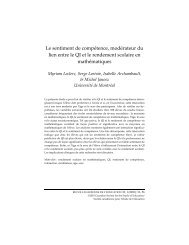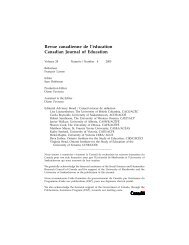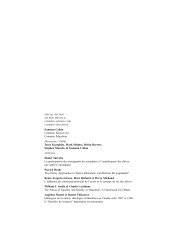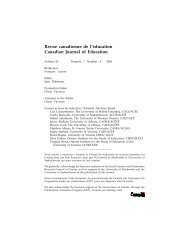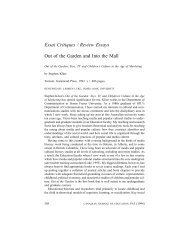Mireille Falardeau et Michel Loranger Le choix de stratégies ... - CSSE
Mireille Falardeau et Michel Loranger Le choix de stratégies ... - CSSE
Mireille Falardeau et Michel Loranger Le choix de stratégies ... - CSSE
Create successful ePaper yourself
Turn your PDF publications into a flip-book with our unique Google optimized e-Paper software.
GENDER STUDIES AND TEACHER EDUCATION 415<br />
positions to carry on as in the past or use the opportunity to establish new directions.<br />
1 We recognized that we could, perhaps, achieve both. The traditional stress<br />
on the disciplined study of education through history, philosophy, sociology, and<br />
anthropology could be strengthened by focusing staffing efforts in an area that<br />
would add a new direction to the <strong>de</strong>partment’s concerns; gen<strong>de</strong>r studies provi<strong>de</strong>s<br />
just such an area. Scholarship in gen<strong>de</strong>r studies, with its bases in the <strong>de</strong>partment’s<br />
traditional disciplines, would enhance the disciplined study of education.<br />
Some of the most promising and exciting work in the foundational fields, as well<br />
as some that may lead to <strong>de</strong>ad ends, is being done in the area of gen<strong>de</strong>r studies.<br />
As well, a focus on gen<strong>de</strong>r studies is appropriate at this time in Canadian soci<strong>et</strong>y.<br />
Events in soci<strong>et</strong>y, some horrific and other ludicrous, have <strong>de</strong>monstrated the<br />
necessity for universities and faculties of education to take seriously the concerns<br />
raised by gen<strong>de</strong>r studies.<br />
Our thinking raised issues far beyond our <strong>de</strong>partment. We believe that gen<strong>de</strong>r<br />
studies can teach us much about teacher education, and it is those lessons we<br />
pursue here. We begin by <strong>de</strong>fending our <strong>de</strong>cision to talk of “gen<strong>de</strong>r studies,”<br />
rather than “women’s studies” or “feminist studies.” Next we explain how gen<strong>de</strong>r<br />
studies can be integrated into “traditional” aca<strong>de</strong>mic courses and approaches.<br />
Finally, we justify an integrated approach to gen<strong>de</strong>r studies, or the mainstreaming<br />
of gen<strong>de</strong>r studies in teacher preparation programs, because it enhances and illuminates<br />
what teacher education programs ought to be trying to achieve.<br />
MAINSTREAMING “GENDER”<br />
Our initial approach to the <strong>de</strong>partmental council about mainstreaming the<br />
compulsory core courses was motivated less by i<strong>de</strong>ological and philosophical<br />
concerns (although we were committed to the i<strong>de</strong>a of integration for reasons both<br />
pedagogical and philosophical) than by a sense of urgency. This sense of urgency<br />
was intensified by a growing unease that <strong>de</strong>partmental offerings had remained<br />
unchanged for a number of years, and that the <strong>de</strong>partment had to take a new<br />
direction to be relevant in a milieu increasingly unresponsive to foundational<br />
subjects and exposition of the humanities in a professional faculty. We argued<br />
pragmatically that mainstreaming core and especially compulsory courses would<br />
reinvigorate the <strong>de</strong>partment and sustain its lea<strong>de</strong>rship in teacher education and<br />
in research and scholarship in the foundational fields.<br />
“Mainstreaming” is the term commonly used in women’s studies to <strong>de</strong>scribe<br />
the basic notion we advocate. Because this term is ambiguous in faculties of<br />
education and school systems, it would be useful to have a synonym. Fortunately,<br />
mainstreaming has embraced mutually inclusive terminology in the literature,<br />
including: integration, balancing, transforming (the curriculum), and reclaiming<br />
(female experience). We shall use “integration” and “balancing” interchangeably<br />
because these suggest the compl<strong>et</strong>e education of men and women in the re<strong>de</strong>signing<br />
of curriculum and course content, which in turn suggests a re<strong>de</strong>finition of


